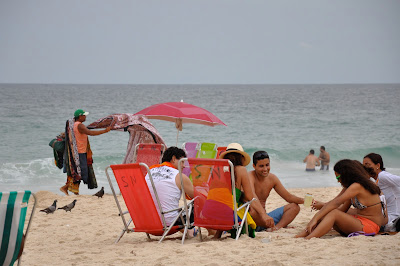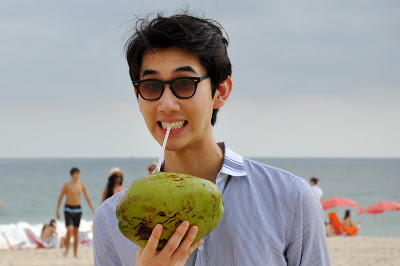Public beaches are remarkably democratic; open to all, they host interesting cross-sections of society that, especially for a curious foreign tourist, make for great people-watching.
 |
| Praia de Ipanema |
Democratic doesn't necessarily imply unsegregated, though; a unique phenomenon on Rio's beaches is the existence of social boundaries defined by postos that subdivide the beach into areas as diverse as the city itself.
Here's an excerpt from the Lonely Planet city guide about the sections:
Posto 9, right off Rua Vinícius de Moraes, is Garota de Ipanema, which is where Rio's most lithe and tanned bodies tend to migrate. The area is also known as the Cemetério dos Elefantes because of the handful of old leftists, hippies and artists who sometimes hang out there. In front of Rua Farme de Amoedo the beach is known as the gay section, while posto 8 further up is mostly the domain of favela kids. Arpoador, between Ipanema and Copacabana, is Rio's most popular surf spot. Leblon attracts a broad mix of single Cariocas, as well as families from the neighborhood. Posto 10 is for sport lovers, with ongoing volleyball, soccer and frescobal games. There's also Baixo Bebê, between posts 11 and 12, where affluent parents with children migrate.
 |
| Posto 10 |
Lonely Planet certainly wasn't wrong about posto 10 being a hangout for sport lovers—the post overlooks a series of volleyball nets and other sporting areas—but the sport lover zone designation could be extended to the entire city; Rio is the most fitness-oriented (and, consequently, the most in-shape) cities I have ever seen. Toned joggers weave along the beaches among swimmers, surfistas and, of course, futebolistas*.
 |
| Beach tennis |
*Seriously, U.S. universities should just come to Brazil for recruiting: whether it's favela kids on the beach or upper-class enthusiasts in Leblon, the level of talent exhibited by even casual amateur soccer players here is incredible.
A popular soccer-inspired beach sport here is futevôlei, a sport created in 1965 on Copacabana Beach that combines aspects of soccer and beach volleyball. Think volleyball on steroids without hands—it's as if Brazilians found futebol too easy for them and thus invented a sport that would present an actual challenge. The skill of the players below had my family and me gawking (along with a handful of Scandinavian tourists).
On an non-athletic note, one of the best aspects of Brazilian beaches is the abundance of small shops selling everything from coconut water to beach chairs. These vendors will often deliver your order, say a fresh caipirinha, straight to your spot on the sand.
 |
| Juice stand |
 |
| Cerveja kegs |
 |
| Blankets for sale |
 |
| A minha água de coco |
Em conclusão, as praias do Brasil não são muito democráticas, mas todos os que vão curtem o sol, a beleza do mar e o ambiente bom.





